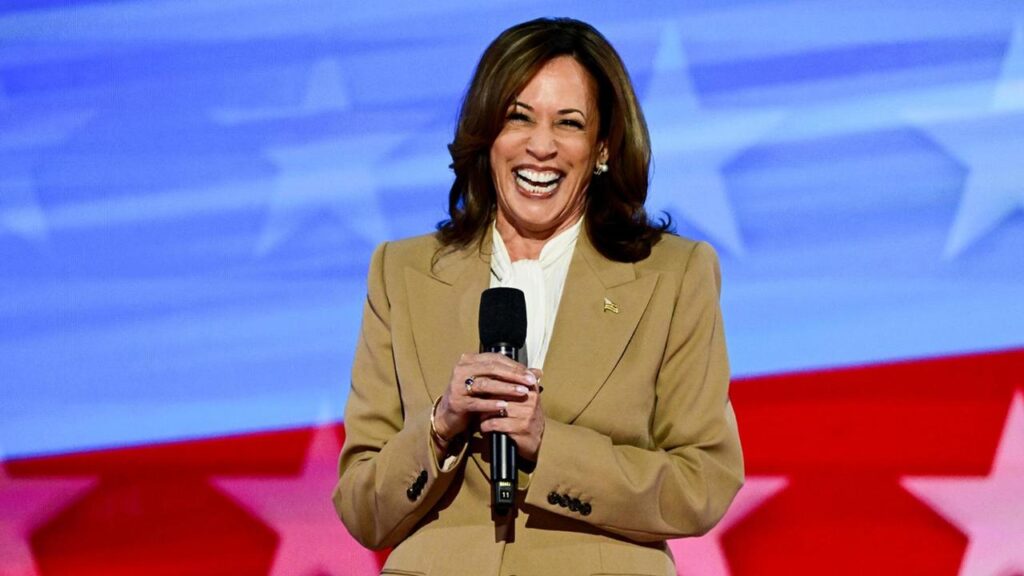Vice President Kamala Harris suffered another humiliation at the Democratic National Convention on Tuesday, as 44 delegates voted “present” during the DNC’s symbolic roll call vote, according to a Daily Caller review.
The vote, a symbolic gesture after the Democrats officially nominated Harris as their candidate with a virtual roll call in early August, highlighted the party’s divide over the contentious Israel/Palestine issue. Likely among the 44 present votes were the 30 delegate members of the “Uncommitted” protest movement. They say they “feel deeply hurt and betrayed by the President’s decisions to continue funding war crimes and the mass killing of Palestinians,” according to their website.
Some members of the Uncommitted movement, including Washington state’s Yaz Kader and Sabrene Odeh, are officially uncommitted delegates, according to The Seattle Times. During the virtual roll call in August, both voted present to pressure Harris into endorsing a ceasefire and an embargo on U.S. weapons to Israel, The Times reported. “I entered my vote on behalf of a 10-year-old who was bombed and killed on her 10th birthday,” Odeh said, according to the outlet. Kader and Odeh joined seven other delegates from Washington in voting present.
Twelve states, alongside Washington, also cast present votes, including Connecticut, Florida, Hawaii, Illinois, Iowa, Louisiana, Michigan, Missouri, New Jersey, Ohio, Texas, and Minnesota—the home state of Harris’ running mate, Tim Walz, according to the Daily Caller review. Minnesota led with ten present votes, the highest number among the states.
The 44 symbolic present votes surpassed the 37 delegates originally pledged to “Uncommitted” before President Joe Biden exited the race. According to NBC News, Harris officially secured 4,567 of the 4,695 available delegates, significantly exceeding the 1,967 delegates required for the nomination. It should be noted, however, that Harris didn’t get a single delegate during the 2024 Democratic primaries; President Joe Biden won them all. Also, she was among the first Democratic candidates to drop out of the 2020 race when she failed to the primary even in her home state of California.
Harris is set to accept the Democratic presidential nomination during a formal presentation at her party’s convention in Chicago this week, but in the meantime, her campaign, along with lame-duck President Biden, got more bad news ahead of the 2024 election.
An increasing number of Americans are curbing their spending as they grapple with rising costs for everyday essentials such as food, rent, and auto insurance. Recent findings from Empower reveal that 62% of Americans believe their purchasing power and income are diminishing due to ongoing inflation. Furthermore, 82% reported that their money no longer stretches as far as it once did, and 79% observed that the serving sizes of many household goods, like cereal and chips, are shrinking, Fox Business reported.
With prices still uncomfortably high, many people are reaching their spending limits, according to the “Big Shrink” study. About 27% of respondents indicated that they have hit a pricing threshold and are unwilling to pay more for grocery staples. Those who exceed their budget will either stop purchasing these items or remove them from their shopping lists altogether. More than one-third of Americans refuse to pay even $1 more for a cup of coffee, and 20% of Gen Z shoppers said they would stop buying fruits and vegetables if prices keep rising.
Under President Biden, inflation surged to its highest level in 40 years, causing the cost of essentials like rent, groceries, and gasoline to skyrocket. This led the Federal Reserve to raise interest rates to a two-decade high, which in turn pushed mortgage rates above 8% and made it significantly more difficult for businesses to secure credit, the outlet reported.
Although inflation has decreased significantly from its peak of 9.1% and the Fed is expected to cut interest rates this fall, many Americans are still struggling. Food prices have risen 21% since the beginning of 2021, shelter costs have increased by 21.6%, and energy prices are up 32%, according to FOX Business. These higher costs are especially burdensome for lower-income Americans, who spend a larger portion of their limited income on necessities and have less room to save.
Food prices have been a major source of inflationary pain for Americans. According to a survey by Yahoo Finance/Ipsos published in November 2023, over two-thirds of voters say that higher food costs have been the most significant impact of inflation, far exceeding the impact of increases in gasoline, transportation, and housing expenses. Rising food prices are particularly troubling as they affect nearly every household in the country. Low-income Americans bear a disproportionate burden, spending about 30% of their income on food, as reported by the USDA.



